
Product test
Play Suisse: the idea is good, but its implementation leaves something to be desired
by Luca Fontana

Pierre-Adrian Irlé is the project manager and intrapreneur behind the new SRG streaming app "Play Suisse". In this interview, he not only answers my questions, but also the comments column of the digitec and Galaxus Community.
A review that made waves. All the way to Leutschenbach and Geneva, to be precise. Where the headquarters of Swiss Radio and Television are located. Where "Play Suisse", the new SRG streaming app, was developed.
The project is being led by Pierre-Adrian Irlé. The person who contacted me as soon as the Play Suisse review was online.
He wanted to talk to me about my article, according to the email. Not to correct anything. On the contrary. Irlé is interested in feedback. Wants to know exactly what worked and what didn't. I bite. On the condition that I get an interview with him. I'm not the only one with questions. Our readers do too, as numerous comments in the review have shown.
Pierre-Adrian Irlé agrees
Pierre, you are responsible for Play Suisse. The project manager. Do you use streaming services at all?
Pierre-Adrian Irlé: Of course! Among other things, I use HBO Now via VPN (laughs).
Actually? Can I write it like that (laughs)?
Sure, I don't mind. I just lived in America for a few years. Now that I'm back in Switzerland, VPN is the only way I can continue to enjoy these shows. It's just one of those things, access to streamable content. And it's a huge challenge for the media industry itself. Apart from that, I watch a lot of Netflix. I really enjoyed Michael Jordan's "The Last Dance". And I'm currently watching the fourth season of "The Crown" with my girlfriend. And then there's YouTube. They have a really incredible suggestion algorithm. I practically don't have to search for anything myself anymore. Except for "Adam Ondra", an incredibly good climber who makes new videos every week.
And then comes Play Suisse. A kind of hub for Swiss films, series and documentaries. Especially for SRG's own productions. So why is "The Undertaker" missing?
It will come, I promise! In the next few weeks. All seven seasons. The reason why we didn't have The Undertaker investigated at the same time as the launch of the app is - well, there are actually two reasons. On the one hand, all the content you watch on Play Suisse will have subtitles in German, French and Italian from launch. That takes an incredible amount of time. Originally, we wanted to generate the subtitles automatically and fully automatically. To save time. But the quality was really bad. So what we do now is first have the generated subtitles checked by a translation team and then corrected by a proofreader.
And on the other hand?
On the other hand, another topic is getting in the way. Sponsorship. An artefact of linear television. But we are not legally allowed to advertise online. That's why such sponsorship income is all the more important. Especially with product placement. It must be clearly signalled who the main sponsor is for each piece of content. But with series, for example, the main sponsor varies not only from season to season, but also from language region to language region. We first have to develop a tool for such stories.
«Our Play Suisse team is organised like a small, autonomous start-up company within SRG.»
SRG actually produces a lot of incredibly good content, all of which needs subtitles. I, for example, watch many of your documentaries and reports. I'm rarely disappointed.
Thank you very much. Yes, we work really hard on our content. I think we're sitting on a kind of gold mine of good content here. Now we just have to learn to dig even deeper and bring all the great content to light.
Many of our readers were all the more disappointed after the launch of the app. The criticism that I read the most and also expressed myself in the test is that the app seems unfinished.
I absolutely understand that. I can absolutely understand that. Especially the disappointment. I think there are two categories. On the one hand, people are disappointed about what's missing, but on the other hand, they're disappointed about the things that are there but don't work properly yet.
You could put it like that, yes.
Our Play Suisse team is organised like a small, autonomous start-up company within SRG. There aren't many of us and we have a relatively small budget. Together, we started from scratch, around September 2019, and within months we had created the Play Suisse website and app from nothing.
From nothing? How did you go about it?
Put simply, we worked with technological "building blocks" that make up the different levels of our app. Cloud services, backend and data platforms, developer engines. Things like that. We worked with external partners for this. The front end, on the other hand, was developed entirely in-house. The code belongs to us, remains internal and is not exchanged with external partners. Just like the user data that we need for the search algorithm, which in turn sends suitable recommendations to our users.
So you didn't just buy an "off-the-shelf solution"
Exactly. We wanted to define our own roadmap. Formulate our goals and visions ourselves. Decide for ourselves what needs to be ready when and in which order we tackle which challenges. The thing with the multiple profiles per log-in, for example, which you mentioned in your review. That's something we definitely want and something the app certainly needs. However, we didn't consider the feature to be critical for the release. With our small, limited team, we had to prioritise things differently.
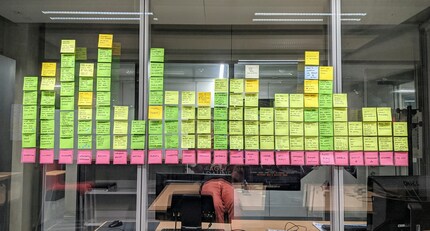
For example?
We know that the majority of viewers do not consume SRG content via the app (note: Play SRF), but via the web browser. That's why it was extremely important to us that Play Suisse works flawlessly in the web browser...
... and only later on the TV?
Exactly. Our vision is clear: Play Suisse should be consumed on the big screens. That's why we tested and worked a lot with Android TV and Apple TV. We were even able to win Swisscom TV as a partner for the launch. We are currently in talks with UPC, Sunrise and other smaller cable operators. But we are also talking to TV manufacturers, Samsung and Panasonic, for example. We want our app to appear in their stores too. But that will take some time. As I said: priorities.
You're talking about numerous tests with Android TV.
Exactly. The difficulty with Android is that its market is extremely fragmented. In other words: Android doesn't behave the same everywhere. Android TV on a Panasonic TV is different to Android TV on a Sony TV or Nvidia Shield set-top box. You have to take all of this into account when testing. Incidentally, this is the reason why Play Suisse runs much more stable on Apple TV. Your readers wrote the same thing in your test. In fact, the Apple operating system is significantly less fragmented and therefore behaves much more predictably on its Apple devices.
... but all the problems with Android TV were obvious. Despite your tests. Why not just wait a little longer and then launch Play Suisse when it's fully developed?
I'll be quite frank. We were surprised ourselves at how many problems and bugs there were when we launched the app. Before the launch, you have your app, which you put through its paces within your test environment. Play Suisse seemed much more finished. Then came the launch. And then all the problems that we didn't even know about beforehand. Only then did we realise how many bugs were actually still waiting for us.
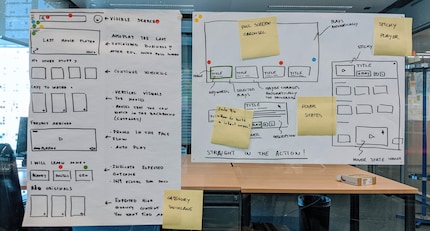
I appreciate your honesty, Pierre.
Thank you. The problem is that people don't differentiate whether a problem exists only on Android for Panasonic or on all Android versions. Why should they? It's not their fault. They have no way of knowing. We simply underestimated how different the experiences would be and how much these experiences would nevertheless be attributed to the app as a whole.
Other than the two of us, it's not their job.
That's right. But for us at Play Suisse, it's an opportunity. In your article, you write that it could take months before the app is in an acceptable condition. That would be normal. But we want to show that we are much faster. That's a very important point in our strategy. We want a rethink to take place.
A rethink?
When we launched Play Suisse, we knew that the app wasn't ready yet. Sure, as I said, we had imagined a more "finished" state at the launch. But the point is that we have the philosophy that Play Suisse will never be fully developed as long as Play Suisse exists and is used.
This sounds familiar. Walt Disney said the same thing in 1955 when he opened his first Disneyland. On opening day, there was hardly anything that worked. The press hated the park. But Walt Disney insisted that the park would never be finished and would be expanded as long as it was used. That was his recipe for success. Totally revolutionary at the time.
That's exactly our spirit. We want to be agile. Fast. Less bureaucratic and more pragmatic. Working with feedback from our users, feeling where the shoe pinches, what the most urgent concerns are and implementing them at a much faster speed than employees are used to. In other words, we want to develop the app together with our users to where people want it to be. After all, we're not developing Play Suisse for ourselves (laughs).
The way you put it, that sounds fantastic.
That's also the reason why I wanted to talk to you right after your article, Luca. Feedback spurs us on. We take criticism on board. And then we surprise people with quick, effective updates. Speaking of which. Have you made the latest update yet?
Yes, I have. Let me try out the app quickly. Yep, actually starts much faster. Could still be a bit faster though (laughs). Hm. A week ago I couldn't put any titles on "My list". Let's see. Okay, it works now. I'm impressed.
That's what we want to achieve. We want our users to realise that it won't take months for the app to work flawlessly. We want to show transparency. Admit mistakes. And fix them much faster than most people expect from a colossus like SRG.
The aforementioned rethink...
Yes, I think this spirit is something new. People normally expect a perfectly functioning, finished product. Things will be different with Play Suisse. And it requires a rethink. Not just among viewers. Also for us, within SRG.
«Play Suisse will never be fully developed as long as Play Suisse exists and is used.»
Is that why you were brought to SRG from outside? According to your Linkedin profile, you've only been there since May 2019.
Quite possibly. I worked in the media industry for many years. As a strategy consultant, for example, in Europe and the USA, but also as a producer and director at my own company in Switzerland. I like it when my work combines creativity, entrepreneurship and strategy in many unexpected ways. Now I'm here to bring this new philosophy to SRG, which is much closer to the audience and their immediate feedback.
And there's more than enough feedback. Also in the Play and App Store. What is the feedback that you personally have received most often about the app?
Why is there no tablet app? The answer: prioritisation. The web version of Play Suisse was more important to us at the start. Tablet users can use Play Suisse via a web browser. What I didn't realise is that all smartphone apps in the App Store are also available for tablets. It looks terrible on tablets. For us, this means that we have to finalise the tablet version of Play Suisse much faster than originally planned. That's why it will be ready in a few weeks. Maybe sooner.
That's all?
People are still missing Chromecast and AirPlay support. That will also be added in the next two or three weeks. Then we'll look at the feedback from users and react accordingly. A bit of trial and error. Step by step. That's also part of the rethink.
You sound super motivated. Didn't all the negative feedback bother you at all?
Yes and no. We didn't just get bad reviews. There was also praise. You know, our team consists of three front-end developers, one back-end developer and two data scientists. Then there's Marketing, Content and Translation. That makes a total of 17 people. That's how small our team is. Together, we have built the entire app and catalogue from scratch over the last fourteen months. We've all worked hard for months and stayed up all night. I'm extremely proud of that. We are aware that we are not Netflix. Nevertheless, people expect Netflix quality from us. But Netflix has a few more employees than we do.
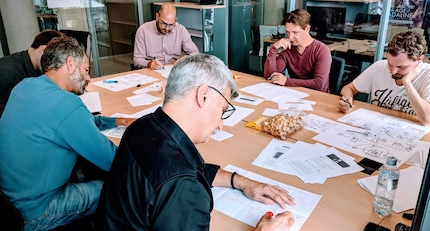
Let me do a quick google. So according to the statistics, there were a total of 8600 Netflix employees in 2019
Exactly (laughs). It's hard to live up to these standards every day. And after all this work, the feedback doesn't leave us completely cold. That's normal. We are only human. But we are highly motivated not only to fulfil the high expectations, but also to exceed them.
What were the biggest hurdles at the beginning?
When I joined SRG just over a year ago, I first had to learn how the company works. After all, we're talking about Switzerland's largest media company, which was founded almost 100 years ago. There are a lot of slow-moving mills that have been grinding away for ages and know exactly how and when to grind. Do you understand what I mean?
Absolutely. I used to work for Kuoni.
And then along comes me, the new guy, fresh from the outside, who wants to motivate and inspire people with his start-up feeling. Before I could do that, I had to learn everything there was to learn about the company. Then I started with benchmarks to find out what other streaming services do well, what they do less well and what we can adapt for Switzerland, a small country with four national languages and many more small subcultures.
Sounds challenging. Do you have a specific example?
Yes, the key visuals. In other words, the small thumbnails that you see with every piece of suggested content. They are incredibly important. Most people decide whether or not they are interested in a piece of content based on the image rather than the description. So we developed a tool that searches all content for good screenshots that are not too dark or too light and that show interesting objects, places or people. For each piece of content, the tool spits out twenty suggestions. We then added titles to them. Unlike many streaming services, however, we didn't want to simply use the same font and font size everywhere. We wanted variety.
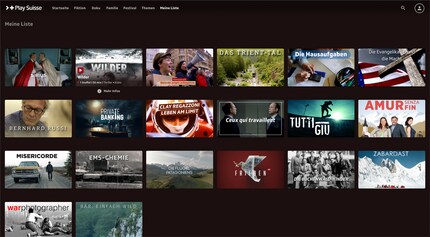
Off. All this trouble with your little team...
That's right. You can see what I mean by months of labour. And with all that, it was still important not to deviate too much from the visual style of something like Netflix. People have got used to it. They don't want us to do everything radically different just to make it look different.
And what are the big hurdles ahead now?
Utilising and processing all the feedback. Things like the performance problems you mentioned or incorrectly set subtitles. Just bugs. The good thing is that bugs are things we can fix. If the basic app design wasn't good, we'd have a problem. With our small team, it would hardly be possible to fix it in a short space of time. But most users seem to be very happy with the design.
Speaking of satisfaction. Where do you want Play Suisse to be in two years' time so that you are satisfied?In the long term, we want to be where our viewers are. We don't want them to have to look for us. That's not their job. But we are already in contact with important players such as UPC, Sunrise, Samsung, Panasonic and others. In terms of processes, we want to become much faster in terms of preparation. For example, if we get the rights to "The Undertaker" today, it should be on Play Suisse tomorrow if possible. We currently need far too much time to create subtitles, key visuals and title descriptions. And always in three languages. In future, we will increasingly rely on new, AI-supported technologies to shorten these times.
«The good thing is that bugs are things we can fix. If the basic app design wasn't good, we'd have a problem.»
And in terms of content?
In terms of content, we are considering how and with whom we can enter into new partnerships. We are currently prioritising SRG content and working closely with Swiss filmmakers. However, we want to see whether we could also do something with other broadcasters. For example, with the German broadcaster Arte. Or with international film festivals. Especially now that many festivals have had to be cancelled due to the pandemic. My dream, for example, would be to stream the Montreux Jazz Festival into Swiss people's living rooms.
The SRG already has a streaming app. Play SRF. Why all the cost and effort for a completely new app?
There are two reasons. Play SRF is a product that is around eight years old. The technology behind it is correspondingly old and in any case far too closely linked to linear television. A Tagesschau programme lands directly on Play SRF as soon as it is broadcast. Play SRF is mainly used as a catch-up tool in case you have missed a programme. That's why we wanted to develop something new, with new technologies that are not so closely linked to linear television.
And the second reason?
If we had taken an existing app as a basis, we wouldn't have been allowed to change it too much. We shouldn't have taken any risks. People are already using the app. Trying things out and experimenting is not an option. The risk that we could have broken something was too great.
What does it cost to develop an app like this anyway?
Our budget is 5 million francs per year. This goes not only into research and development, but also into maintaining the infrastructure, creating subtitles and the licence fees that we pay for our content. These consume almost the most money.
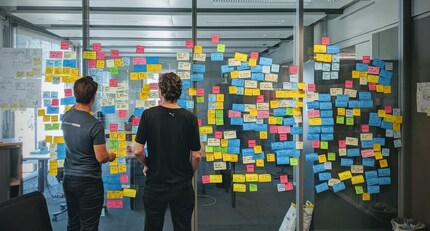
How long does such content remain available on Play Suisse?
Roughly between six months and three years. Then the content disappears again or we extend the licences. I think that's a good length of time. If someone puts something on their list, it's to view the content within the next three or four months.
Okay. Let me categorise this. SRG announced a 50 million savings programme at the end of September. By 2024, 250 people will lose their jobs. At the same time, SRG is launching this huge new project.
I know what you're getting at. And your objection is absolutely legitimate. I explain the savings programme as follows: On the one hand, SRG is taking in less money than before because of the No Billag initiative. On the other hand, the broadcaster has had to forego a lot of advertising and sponsorship money due to the current pandemic. This is particularly due to the cancellation of major events such as the Olympic Games or the European Football Championships. This has probably led to the savings programme.
«My dream would be to stream the Montreux Jazz Festival into Swiss people's living rooms.»
But you're allowed to keep experimenting?
Correct. But our 5-million-euro budget needs to be put into perspective. At SRG, we are talking about a total budget of 1.6 billion francs a year. We take 5 million a year from that and turn it into Play Suisse with 17 people.
I see. My last two questions were also deliberately somewhat provocative.
That's exactly how it should be. A soft-pedalled exchange is no use to anyone. Let me say something else about our budget. SRG is in a phase of transformation. Away from being a pure broadcaster and towards becoming an online service. But such a transformation requires money. We can't change SRG without investing. This must still be possible despite the savings programme. If we simply carry on as before, in a few years' time we will be even worse off than we are now by international standards. Then it won't do us any good to realise that we missed the signs of the times and didn't react to them.
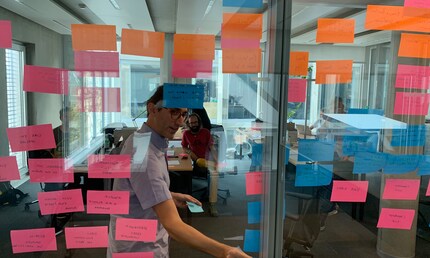
I'm looking forward to the changes. Many of our readers think that SRG content is more for an older audience. Not for the young people who use streaming services.
This is also a legitimate criticism. As things stand today, we don't have a budget for in-house productions that we can influence directly. That has to be decided by the broadcaster, which currently has around 32.5 million francs a year at its disposal for the development and production of a wide range of projects with independent producers. But it is definitely a question for the future. We wouldn't mind if one day we were also given our own budget for Play Suisse productions.
And until then, you're at the mercy of what the parent company offers you.
Not quite. What we can do is analyse who exactly our audience is. We have established that around half of the potential Play Suisse audience is the existing audience of the linear SRG programme. The other half consists of people who have lost their connection to SRG. Mostly younger people who have now switched to Netflix, Sky and the like. Or simply those who have never watched SRG content in their lives. Over time, we want Play Suisse to become the reference streaming platform for Swiss productions and high-quality cultural content. So that we can earn a place alongside, not in place of, Netflix.
By also making room for young, bold and unknown filmmakers on Play Suisse?
Absolutely! I mean: If there's a place where this is possible, it's on Play Suisse. Disney+, Apple TV and the like would hardly buy such arthouse films or content beyond the mainstream. Or if they did, they certainly wouldn't stick it on the front of the app. Apart from that, I don't see any other international players investing in arthouse projects in Switzerland either.
«If there's one place where this is possible, it's on Play Suisse.»
Sounds great, but also a bit hypocritical. At SRG, such programmes are already usually shown at midnight. Certainly not at prime time.
That's exactly why the window offered by Play Suisse is so important. We can step in where the broadcaster or other players such as Netflix are lacking and bring unseen Swiss arthouse productions out of obscurity.
Even if they're not exactly traffic drivers? Does the SRG even allow such things?
Who cares! We are a public service. And because we are not linear television, we are not dependent on ratings and advertising money. That's exactly the great thing about Play Suisse. We can, may and should take risks. We want to savour that to the full.
Could Play Suisse even become a promoter of Swiss film? Internationally, Swiss film is treated very neglected. You hear a lot more about Icelandic, Danish or Swedish productions.
That's a good question. For us to really make an impact, Play Suisse and its films would have to be shown abroad. But with our current budget, we can't possibly afford that. All the rights and licences would also have to be bought for foreign markets and territories. What we can do, however, is at least give Swiss film and its small, unknown productions an appropriate stage in this country.
«Who cares! We are not linear television, nor are we dependent on ratings and advertising money.»
Pierre, what do you think Swiss film is missing to attract more international attention?
If I had the recipe for it, I probably wouldn't be here (laughs). In general, however, I believe that Switzerland lacks the "big country problems" needed to tell credible stories that also attract attention abroad. Let's compare our films with American or French films. There you see characters with problems that are plausible there, but not here.
I'm not sure I follow you...
I'll give you a few examples. Large, multi-agency investigations that extend abroad. Explosions. Impending terrorist attacks. Political conspiracies that threaten the fabric of the world. Just big country problems. These things don't seem credible in Switzerland, even if they actually existed. But these are the topics that attract attention abroad.
So what can we do?
Focus on very local, credible stories. The best stories are those that focus on things that we don't like ourselves. In other words, where it hurts to look. That's where the good stories are.
"Platzspitzbaby", for example.
Exactly. Or "Peace", currently on Play Suisse. A story that also sheds light on a historical topic that Switzerland is not proud of. Other topics could be weapons production. Or Verdingbuben. Films about such things are often successful. But precisely because we don't like to look at them, many filmmakers find it difficult to do so.
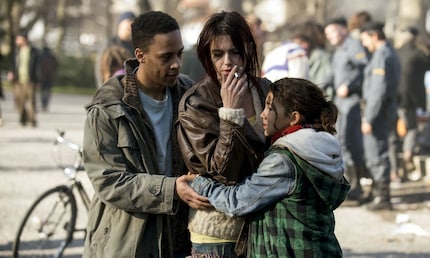
What do you think of the accusations that Swiss cultural funding provides more articles for the production of films than for the production of screenplays?
Another reason why Swiss film is struggling to establish itself. Without good stories, there can be no good films. In Switzerland, there is a lack of institutions that teach young people how to write scripts. To tell stories. To develop themselves further. Perhaps the profession itself is simply lacking. In Switzerland, nobody can make a living from screenwriting alone.
I have an idea for a screenplay. What do you think: a failed pop singer and a kind-hearted disabled person help the grandmother come out. The rebellious daughter helps. Title: NEBENWIRKUNGEN.
Oh God
Okay, the idea didn't really come from me. I generated it with the Swiss Film Generator. Incidentally, it's a tool from the SRG late-night show "Deville". It could be used to generate some bold ideas.
Good luck with the cocktail (laughs).
Is there anything else I haven't asked you that you would like to share with me and our readers?Yes, with pleasure. I think it's become a bit of a national sport to criticise SRG for everything and anything. But I believe that we can really send out a signal with Play Suisse. Show that we can do things differently. Sure, we're not perfect. And certainly not flawless. But that's part of our concept. We have had to break a lot of internal rules to be allowed to stand as we are. I hope that this has paid off in the long term. We accept criticism. Very gladly, in fact. If we show people how quickly we respond and how much they can contribute to the development of Play Suisse, we will win back their trust. And at the end of the day, we do all of this for our users.
Thank you for the interview, Pierre.
Thank you.
Pierre-Adrian Irlé heads Play Suisse, the new national streaming platform of SRG SSR. Previously, Pierre-Adrian worked as a film and television producer, author and director.
His work includes the television series Station Horizon and the feature film All that Remains. He also worked at global management consultancy Arthur D. Little, where he began his career as a consultant, then senior advisor and media director.
I write about technology as if it were cinema, and about films as if they were real life. Between bits and blockbusters, I’m after stories that move people, not just generate clicks. And yes – sometimes I listen to film scores louder than I probably should.
Interesting facts about products, behind-the-scenes looks at manufacturers and deep-dives on interesting people.
Show all